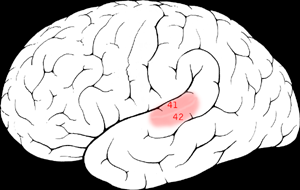Primary auditory cortex
From Psy3241
| (4 intermediate revisions not shown) | |||
| Line 1: | Line 1: | ||
| - | [[image:Brodmann_41_42.png| | + | [[image:Brodmann_41_42.png|300px|thumb|Brodmann areas 41 and 42: the primary auditory cortex]] |
| + | |||
| + | The primary auditory cortex, denoted as Brodmann areas 41 and 42, is the area in the brain which receives sensory auditory information directly from the ears. Like most sensory modalities, information from the right ear is directed to the left primary auditory cortex, and information from the left ear is sent to the right primary auditory cortex. The primary auditory cortex is located on Heschl's gyrus the lateral sulcus, and the posterior half of the superior temporal gyrus. | ||
| + | |||
| + | == Plasticity == | ||
| + | |||
| + | The cortex has been observed to be plastic. When an area of the brain is deprived of its usual sensory input, it sometimes "switches" to another sensory modality to, in a way, help out with processing. The primary auditory cortex has shown to be activated by visual stimuli when deprived of auditory input. | ||
| + | |||
| + | == Deaf Hearing == | ||
| + | |||
| + | Deaf hearing is the auditory analogue to [[blindsight]]. Like in blindsight, patients with deaf hearing have bilateral lesions in temporal areas involved in auditory perception, especially the primary auditory cortex. However, due to subcortical auditory pathways in the midbrain and brainstem remaining active, some level of auditory processing remains despite the fact that the patient experiencing cortical deafness has no awareness of hearing sounds. Although the patient has no awareness of hearing sounds, they display orienting reflexes to auditory stimuli despite insisting they heard nothing. | ||
| + | |||
| + | == References == | ||
| + | |||
| + | Garde, M. M., & Cowey, A. (2000). "Deaf hearing": Unacknowledged detection of auditory stimuli in a patient with cerebral deafness. ''Cortex, 36'', 71-80. | ||
| + | |||
| + | Newton, J. R., & Sur, M. Rewiring Cortex: functional plasticity of the auditory cortex during development. ''Department of Brain & Cognitive Sciences, Picower Center for Learning & Memory, Massachusetts Institute of Technology, Cambridge, Massachusetts.'' | ||
| + | |||
| + | [[Category:Brain areas]] | ||
Current revision as of 04:16, 27 April 2008
The primary auditory cortex, denoted as Brodmann areas 41 and 42, is the area in the brain which receives sensory auditory information directly from the ears. Like most sensory modalities, information from the right ear is directed to the left primary auditory cortex, and information from the left ear is sent to the right primary auditory cortex. The primary auditory cortex is located on Heschl's gyrus the lateral sulcus, and the posterior half of the superior temporal gyrus.
Plasticity
The cortex has been observed to be plastic. When an area of the brain is deprived of its usual sensory input, it sometimes "switches" to another sensory modality to, in a way, help out with processing. The primary auditory cortex has shown to be activated by visual stimuli when deprived of auditory input.
Deaf Hearing
Deaf hearing is the auditory analogue to blindsight. Like in blindsight, patients with deaf hearing have bilateral lesions in temporal areas involved in auditory perception, especially the primary auditory cortex. However, due to subcortical auditory pathways in the midbrain and brainstem remaining active, some level of auditory processing remains despite the fact that the patient experiencing cortical deafness has no awareness of hearing sounds. Although the patient has no awareness of hearing sounds, they display orienting reflexes to auditory stimuli despite insisting they heard nothing.
References
Garde, M. M., & Cowey, A. (2000). "Deaf hearing": Unacknowledged detection of auditory stimuli in a patient with cerebral deafness. Cortex, 36, 71-80.
Newton, J. R., & Sur, M. Rewiring Cortex: functional plasticity of the auditory cortex during development. Department of Brain & Cognitive Sciences, Picower Center for Learning & Memory, Massachusetts Institute of Technology, Cambridge, Massachusetts.

